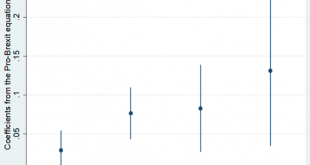Setting the record straight.AeonThe real Adam Smith Paul Sagar | lecturer in political theory in the Department of Political Economy, King’s College London
Read More »Italian Election–Two Months and Counting
By Marc Chandler (originally published at Marc to Market) Germany does not have a government, though the election was more than three months ago. Spain, Portugal, and Ireland have minority government. Austria is the first government since the financial crisis to include the populist right. The EU is trying to press Visegrad group of central European countries to conform to the values of...
Read More »Bill Mitchell — What matters about the Paradise Papers
A cursory glance at the World’s leading tax havens illustrates the hypocrisy of politicians getting wound up about the revelations in the recently released Paradise Papers and the Panama Papers before them. Many of the havens are within the direct legislative jurisdiction of nations such as the US (which is itself a tax haven) and the UK, for example. And we should not forget that Luxembourg, Switzerland are key European homes of tax avoidance. Remember that the current President of the...
Read More »The General Theory at 80: Reflections on the History and Enduring Relevance of Keynes’ Economics
This paper reflects on the history and enduring relevance of Keynes’ economics. Keynes unleashed a devastating critique of classical macroeconomics and introduced a new replacement schema that defines macroeconomics. The success of the Keynesian revolution triggered a counter-revolution that restored the classical tradition and now enforces a renewed classical monopoly. That monopoly has provided the [...]
Read More »Brexit was a cry of financial pain and not the influence of the old
Originally published on 17 October 2017 at Vox By Federica Liberini, Andrew Oswald, Eugenio Proto, Michela Redoano There is a very wide debate on the determinants of the vote by British citizens to leave the EU. In particular, the idea that this vote reflects discontent and disillusionment has been widely discussed in the UK and European media. Furthermore, large numbers of newspaper and TV...
Read More »Brian Romanchuk — Why MMT Is So Popular (For People Like Me)
In a previous article, I explained why I am complacent about the state of economic theory in Modern Monetary Theory (MMT). This matters for someone like myself, who is attempting to write primers explaining various economic concepts. However, for many followers of MMT, the more important question is how its theoretical concepts get translated into a new policy framework. This raises the question of political economy, which I largely shy away from. However, I will offer my eccentric...
Read More »Bill Mitchell — Reclaiming the State
On June 3, 1951, the Socialist International association was formed in London. It is still going. It is “a worldwide association of political parties, most of which seek to establish democratic socialism”. Its roots date back to the C19th (to the First International formed in 1864) when it was considered beneficial to unite national working class movements into a global force to overthrow Capitalism. Internal bickering among various factions led to various dissolutions and reformations over...
Read More »Trump and the Neocons: Doing the Unilateralist Waltz
The neocon factor dramatically changes the interpretation of the Trump administration’s unilateralist international economic policy chatter. Donald Trump’s first one hundred days have revealed his inclination for unilateralism in international relations. That inclination reflects his opportunistic and bullying disposition, and it also fits well with his anti-globalization pose. Trump’s unilateralism has also spawned a dangerous waltz with [...]
Read More »The Real Reasons for Trump’s Anti-Globalization Circus
Trumponomics: How Trump skillfully used anti-globalization as bait to cover up his extremely neoliberal switch. A key element of Trump’s political success has been his masquerade of being pro-worker, which includes posturing as being anti-globalization. However, his true economic interests are the exact opposite. That creates conflict between Trump’s political and economic interests. For political leaders [...]
Read More »Monetary Policy and the Punch Bowl: The Case for Quantitative Policy and Wage Growth Targeting
Federal Reserve Chairman William McChesney Martin famously declared that the Federal Reserve “is in the position of the chaperone who has ordered the punch bowl removed just when the party was really warming up.” This paper uses the punch bowl metaphor to analyze how the Federal Reserve can improve monetary policy so as to deliver [...]
Read More » Heterodox
Heterodox

